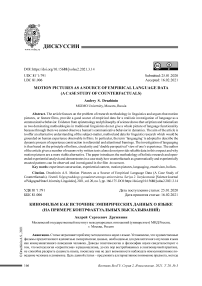Motion pictures as a source of empirical language data (a case study of counterfactuals)
Автор: Druzhinin Andrey S.
Журнал: Вестник Волгоградского государственного университета. Серия 2: Языкознание @jvolsu-linguistics
Рубрика: Дискуссии
Статья в выпуске: 3 т.20, 2021 года.
Бесплатный доступ
The article focuses on the problem of research methodology in linguistics and argues that motion pictures, or feature films, provide a good source of empirical data for a realistic investigation of language as a communicative behavior. Evidence from epistemologyand philosophy of science shows that scriptism and rationalism as two dominating methodologies in traditional linguistics do not give a whole picture of language functionality because through them we cannot observe a human’s communicative behavior in dynamics. The aim of the article is to offer an alternative understanding of the subject-matter, method and data for linguistic research which would be grounded on human experience observable in films. In particular, the term ‘languaging’ is adopted to describe the dynamic process of experience construction in referential and attentional framings. The investigation of languaging is thus based on the principle of holism, circularity and ‘double perspectival’ view of one’s experience. The author of the article gives a number of reasons why written texts alone do not provide reliable data in this respect and why motion pictures are a more viable alternative. The paper introduces the methodology of holistic research and open-ended experiential analysis and demonstrates in a case study how counterfactuals as grammatically and experientially enacted patterns can be observed and investigated in the film Atonement .
Experience construction, experiential context, motion pictures, languaging, enactivism, holism
Короткий адрес: https://sciup.org/149137953
IDR: 149137953 | DOI: 10.15688/jvolsu2.2021.3.14
Список литературы Motion pictures as a source of empirical language data (a case study of counterfactuals)
- Bakhtin M.M., 1981. The Dialogical Imagination: Four Essays by M.M. Bakhtin. Austin, University of Texas Press. 480 p.
- Bridgman P.W., 1958. The Logic of Modern Physics. New York, Macmillan, vol. 3. 246 p. (First Published in 1927).
- Ceccato S., Zonta B., 1980. Linguaggio, Consapevolezza, Pensiero. Milan, Feltrinelli. 269 p.
- Druzhinin A.S., Fomina T.A., Polyakov O.G., 2020. Evfemizmy, disfemizmy, ortofemizmy ieksperientsialnyi kontekst: kholisticheskii vzglyad na lingvisticheskuyu problemu [Euphemisms, Dysphemisms, Orthophemisms and Experiential Context: A Holistic View of the Linguistic Problem]. Yazyki kultura [Language and Culture], no. 50 (2), pp. 23-40.
- Foerster H. von, 2003. Understanding Understanding: Essays on Cybernetics and Cognition. New York, Berlin, Springer Science & Business Media. 362 p.
- Glasersfeld E. von, 1995. Radical Constructivism: A Way of Knowing and Learning. Bristol, Falmer Press. 213 p.
- Glasersfeld E. von, Ackermann E.K., 2011. "Reflections on the Concept of Experience and the Role of Consciousness". Unfinished Fragments. Constructivist Foundations, no. 6, pp. 193-203.
- Goodwin C., 2000. "Action and Embodiment Within Situated Human Interaction". Journal of pragmatics, no. 32, pp. 1489-1522.
- James W., 1890. Principles of Psychology. New York, Henry Holt and Company, vol. 1. 716 p.
- Kravchenko A.V., 2016. Constructivism and the Epistemological Trap of Language. Constructivist Foundations, no. 12, pp. 39-41.
- Linell P., 2005. The Written Language Bias in Linguistics: Its Nature, Origins and Transformations. London, Routledge. 256 p.
- Maturana H., 1988. Reality: The Search for Objectivity or the Quest for a Compelling Argument. The Irish Journal of Psychology, no. 9, pp. 25-82.
- Maturana H., 2006. Self-Consciousness: How? When? Where? Constructivist Foundations, no. 3, pp. 91-102.
- Maturana H., 2012. Reflections on My Collaboration with Francisco Varela. Constructivist Foundations, no. 7, pp. 155-164.
- Maturana H.R., Verden-Zöller G., 2008. The Origin of Humanness in the Biology of Love. London, Andrews UK Limited. 252 p.
- Peters J.D., 1999. Speaking into the Air: A History of the Idea of Communication. Chicago, University of Chicago Press. 304 p.
- Piaget J., 1937. La Construction du Réel ChezL 'Enfant. Neuchâtel, Delachaux et Niestlé. 345 p.
- Rickford J.R., 1999. The Ebonics Controversy in My Backyard: A Sociolinguist's Experiences and Reflections. Journal of Sociolinguistics, no. 3, pp. 267-275.
- Valéry P., 1957. OEuvres. Paris, Bibliotheque de la Pleiade. 1872 p.
- Varela F.J., Thompson E., Rosh E., 1993. The Embodied Mind: Cognitive Science and Human Experience. Massachusetts, MIT Press. 309 p.
- Vygotsky L.S., 1962. Thought and Language. Cambridge, Massachusetts, MIT Press. 168 p.


